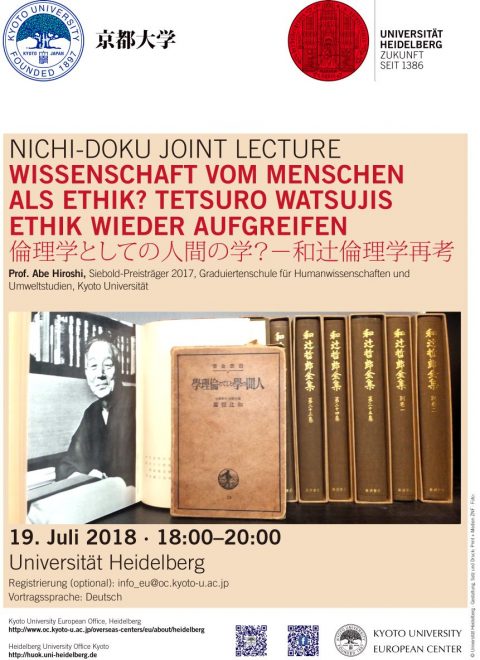 |
Lecturer: Prof. Abe Hiroshi (Siebold-Prize 2017 recipient)
Commentator: PD Dr. Jens Heise
Date: 19 July 2018, 18:00–20:00
Venue: Alte Universität, Aula, Heidelberg University Address: Grabengasse 1, Heidelberg |
Abstract
Tetsuro Watsuji (1889-1960) war ein repräsentativer Philosoph Japans, der 1925-34 als Professor der Ethik an der damaligen kaiserlichen Universität Kyoto tätig war. Seine Ethik (jp: rinrigaku) zählt man zu den reichsten Früchten der modernen japanischen Philosophie. Watsuji selbst definiert seine eigene Ethik als eine Wissenschaft vom Menschen (oder dem menschlichen Sein). Was ist aber damit gemeint? Das erste Ziel des vorliegenden Vortrages ist es, darauf zu antworten. Dazu soll es gezeigt werden, dass Watsuji unter der These über die Ethik als Wissenschaft vom Menschen versucht, von unseren praktischen zwischenmenschlichen Verhältnissen, die von Ort und Zeit abhängig unterschiedlich und nach den Umständen immer veränderlich sind, auf das Ethos, das ihnen zugrunde liegt und von Ort und Zeit unabhängig universal ist, zurückzugehen. Kurzum besagt diese These den Weg von der Wissenschaft vom Menschen zur Ethik.
Mit welchem Recht kann Watsuji aber behaupten, solches Ethos sei universal? Um das zu rechtfertigen, bräuchte man umgekehrt denjenigen Weg von der Ethik zur Wissenschaft vom Menschen, der erklären sollte, dass und wie sich von Ort und Zeit abhängig unterschiedliche zwischenmenschliche Verhältnisse und moralische Normen aus dem betreffenden Ethos (und einzig daraus) deduzieren lassen. Der Vortrag zielt also auch darauf ab, über diesen unbetretenen Weg sozusagen zu ‘tappen’, den sogar Watsuji selbst vermutlich keineswegs betrat.
Tetsuro Watsuji (1889—1960) was a representative Japanese philosopher, who was teaching ethics as a professor at Kyoto Imperial University from 1925 to 1934. His Ethic (rinrigaku) is one of the most prolific approaches in modern Japanese philosophy. Watsuji himself defined his ethic as the “Study of Man” (or the human being). But what does that mean? The first aim of the lecture is to answer this question. It shall be proven, that in “Study of Man as Ethics” Watsuji tries to find an ethos that is independent from the basis of our practical, interpersonal relationships that depend on ever changing circumstances influenced by time and space. In short his hypothesis lights the way from “Study of Man” to an universal ethos independent from space and time.
But by what right can Watsuji claim that such an ethos is universal? In order to justify this, a way from ethics to the “Study of Man” is necessary. This would have to explain how different — on time and space dependent — interpersonal relationships and moral norms canbe deduced from this and only this ethos. The lectures aim is to “trod” upon this untrodden way, that even Watsuji didn’t went down.
Report
Schedule
| 18:15 |
Opening |
| 18:20 |
Welcoming Address Prof. Dieter Heermann (Vice-President International Affairs, Heidelberg University) |
|
18:30
|
Lecture Prof. Abe Hiroshi (Siebold-Prize recipient) “Wissenschaft vom Menschen als Ethik? Tetsuro Watsujis Ethik wieder aufgreifen” (in German) “The Study of Man as Ethics? Tetsuro Watsuji’s Ethics Revisited” |
|
19:10
|
Commentary PD Dr. Jens Heise, Department of Philosophy, Heidelberg University |
| 19:30 | Discussion |
| 19:45 | Closing |
Moderation: Sabine Schenk (Heidelberg University Office, Kyoto) and Kei Ayukawa (Kyoto University European Center)
Registration & Contact
Deadline: 16 July
Please send us an e-mail containing your name and affiliated organization to the following address:
Kyoto University European Centre Heidelberg Office
Email: info_eu@oc.kyoto-u.ac.jp
Tel: +49-(0)6221-54-30034
The registration is not required, but we would be thankful if you did.
* The lecture series “Nichi-Doku Joint Lecture” is organized in close cooperation of the Kyoto University European Center, Heidelberg Office, and the Heidelberg University Office, Kyoto, the liaison offices of both universities in Japan and Germany. It aims at promoting and strengthening research exchange between Heidelberg University and Kyoto University.


